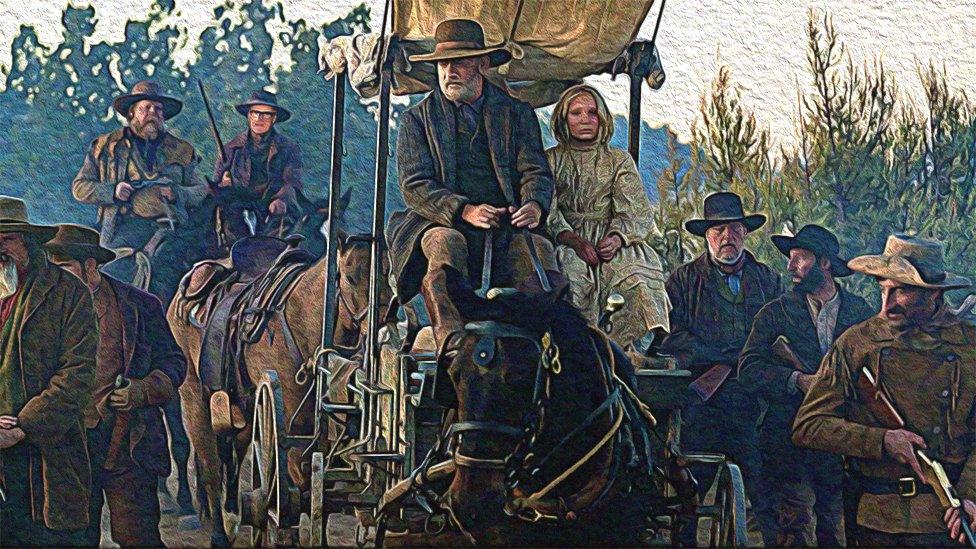News of the World: Will Gompertz reviews Paul Greengrass's new film starring Tom Hanks ★★★☆☆
- Published

News of the World is set in a bitterly divided America, where racism is rife and the news treated as a form of entertainment.
Black men are murdered for the colour of their skin, law enforcement agents intimidate innocent people, a viral epidemic is ravaging communities, and undesirable low-lives lurk on every corner.
Welcome to America in...
1870.
The Civil War is over but the fight goes on over the political direction of the country. The hard-working folk of Texas have little time for President Ulysses S. Grant and his abolitionist agenda.
They're not "sweatin' and bleedin' for some rich Yankee type".


Ulysses S. Grant led the Union Armies to victory over the Confederacy in the American Civil War, before being elected the 18th President of the USA

Feelings are running high down at the Red River community hall, where war veteran Captain Jefferson Kyle Kidd (Tom Hanks) is reading snippets from newspapers to the locals who have paid to hear his edited highlights of the latest news.
"We're all hurting, all of us", he says soothingly in an attempt to take the temperature in the room down a notch or two.
He knows the drill. It's the same wherever he goes in his capacity as a wandering public performer, riding from town-to-town and picking out extracts from local and national papers to a largely illiterate audience, proclaiming:
"I'm here to bring you all the news from across this great world of ours".

Captain Jefferson Kyle Kidd (played by Tom Hanks) bringing the news to an enthralled audience
It's not the most exhilarating existence for an ex-solider, but it puts food in his belly and takes his mind off the dark matters about which he does not speak but are evident from the deep wounds on his back, and battered photograph of a beautiful woman that never leaves his side.
Captain Kidd's simple life becomes significantly more complicated when he encounters an overturned cart with a blood-soaked path leading to a tree from which hangs the body of a black man.
A little blonde-haired girl (Helena Zengel) suddenly runs past him and into the woods. He pursues the terrified child and promises to take her to safety, a kindly gesture that falls flat because she doesn't speak a word of English.
Fortunately, there's a note on the ground that explains her backstory. The girl is called Johanna, she came from a German farming community that was attacked by Kiowa tribe, who kidnapped her having killed her parents and sister. They changed her name to Cicada, made her part of their community where all was super-duper until the army came along a few weeks ago and "cleared them out", leaving the traumatised child twice orphaned.

12 year old Helena Zengel has picked up a Golden Globe nomination for Best Supporting Actress as Johanna Leonberger
And thus begins News of the World, a contemporary Western co-written and directed by Paul Greengrass (the Bourne trilogy), which plays more like an odd-couple road movie (horse and cart, rather than Dodge Viper) than a traditional gun-slinging, horse-galloping, whisky-swigging cowboy caper set in the Old West.
Hanks is Hanks: rock solid, sure-footed, unrushed and very watchable.
The rapport he builds with his largely silent young passenger creates an on-screen emotional bond that gives a gun fight half way through the movie a memorable dramatic force.
Helena Zengel more than plays her part as the confused kid with a wild streak and a lost soul.
It is a magnificently shot picture.
Paul Greengrass and his Director of Photography, Dariusz Wolski (The Martian) have paid attention to every single visual detail. Some of the landscape shots have the sublime sparseness of a Georgia O'Keefe painting, their muddy brown interiors more reminiscent of Walter Sickert on one of his miserable days.
Pretty much every image looks like a gallery-quality painting.



British director Paul Greengrass on the film set with Tom Hanks
There is one major drawback, though.
The story.
It is based on a novel by Paulette Jiles but is a bit thin to carry a full-throated Western movie. Yes, we have a high-speed wobbly wheel on the cart, and a stake-out in the hills, and all the usual stuff you'd expect from the genre. But they are at odds with the more meditative nature of the developing relationship between the old army veteran and young orphaned girl.
The upshot being, it is neither quite one thing or the other, and therefore ends up falling between the two bar stools at the local hostelry. It's either too slow or too fast, not adrenalin inducing or heart-rending. It isn't bad, in many ways it is excellent, but as a coherent piece of work, it just misses the mark.
I would still recommend watching it (for the performances and cinematography alone) but I doubt it will join the pantheon of classic Westerns.
Recent reviews by Will Gompertz:
Follow Will Gompertz on Twitter, external
